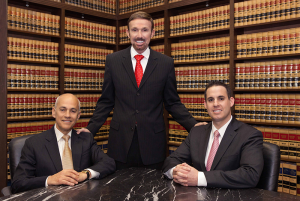Prosecution & Defenses to Employee Theft / Theft by Embezzlement -California Penal Code 484, 503 PC
Prosecution of Employee Theft / Embezzlement
Under California Penal Code 484, any person who fraudulently appropriates property which has been entrusted to him or her is guilty of theft by embezzlement, which is commonly known as employee theft. In order to convict you of this offense, the prosecution must prove the following:
- An owner of property (or the owner’s agent) entrusted his or her property to you AND
- The owner (or the owner’s agent) did so because he or she trusted you AND
- You fraudulently converted or used that property for your own benefit AND
- When you converted or used the property, you intended to deprive the owner of its use
Entrustment

The major difference between theft by embezzlement and other forms of theft is the requirement that the property was entrusted to you by the rightful owner. In order to be convicted of an embezzlement or employee theft offense, you must have legally possessed the property or were given authority to access it. These situations typically arise within the employment context when an employer gives an employee permission to hold onto goods or money belonging to the business.
For example: You are working for a grocery store and your boss gives you a roll of the store’s money and asks you to place it in the store’s safe. The employer’s act of giving you the money for a specific purpose is known as entrustment. If you decide to take the money for yourself rather than placing it in the safe as your employer told you to do, you can be convicted of employee theft or theft by embezzlement.
Fraudulent behavior
In order to be convicted of theft by embezzlement, you must have engaged in fraudulent behavior or conduct with respect to the property in question. This occurs when you take undue advantage of another person or cause that person a loss by breaching a duty of trust or confidence owed to them. A duty of trust or confidence can be implied depending upon the nature of your relationship with the victim. Common examples of when such a duty is implied include employer/employer, lawyer/client, and doctor/patient relationships.
Conversion
Theft by embezzlement requires that you converted or used the property for your own benefit, and that at the time of conversion, you intended to deprive the owner of its use. Conversion is simply another word for “taking” one’s property and using it for your own benefit. Contrary to other theft related crimes, you do not need to have intended to permanently deprive the owner of its use. Therefore, if you take property with the intent to return it to the owner later, you can still be convicted of embezzlement even if owner was only temporarily deprived of its use for a short amount of time.
Agent of the owner
You can also be convicted of theft by embezzlement, or employee theft, if the person who gave you the property was an agent of the owner, rather than the owner himself. An agent is someone to whom the owner has given complete or partial authority and control over the owner’s property. Therefore, if a supervisor or employee gives you property to hold onto or use for the employer’s behalf, you can be convicted of theft by embezzlement, or employee theft, if you decide to take the property and use it for your own purposes.
Possible Defenses to Employee Theft Charges
Defense #1: Lack of intent

An intent to deprive the owner of property, even temporarily, is enough to find you guilty of theft by embezzlement. However, your attorney can argue that you did not have the specific intent to deprive the owner of the property or convert it to your own use. For example: Your friend lets you borrow his car. Without his permission, you have the car re-painted as a gesture of kindness and with the intent to benefit your friend. In this scenario, you did not take the property with the specific intent to convert it to your own use. If successful, this defense negates the intent required for the crime of theft by embezzlement and will likely result in a dismissal of the charges against you.
Defense # 2: Good faith belief
A good faith belief that you were acting with the owner’s authorization to use the property in the manner you did is a defense to a charge of theft by embezzlement. In deciding whether or not you had a good faith belief, the court will consider all the facts known to you at the time you obtained the property. Since you can have a good faith belief even if that belief is mistaken or unreasonable, your attorney can make a strong case for your innocence. However, if you are found to be aware of facts that made that belief completely unreasonable, this defense will likely not succeed.
Defense # 3: False facts
Your criminal defense attorney can also argue that the charges brought against you are based upon false accusations and misleading or inaccurate evidence. In some cases, the alleged victim can falsely accuse you of theft by embezzlement because they are motivated by anger or revenge. In other cases, the victim is mistaken about who actually took the property or that it was even taken at all. An experienced criminal defense attorney can show the judge and jury that the charges brought against you should be dismissed.
Contact the attorneys at Wallin & Klarich if you have been charged with Employee Theft

If you or your loved one is being charged with employee theft, or theft by Embezzlement in California, contact one of our criminal defense attorneys today. We have over 40 years of experience defending clients facing all types of criminal and theft charges, such as grand theft and petty theft, felony larceny, theft by false pretenses and many more. With offices in Orange County, Riverside, San Bernardino, Ventura, Victorville, San Diego, Los Angeles and West Covina, we will be there to provide you with immediate assistance.
Call us today at (877) 466-5245 or fill out our confidential form. We will be there when you call.

